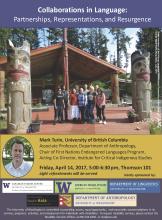Collaborations in Language: Partnerships, Representations, and Resurgence
Mark Turin (PhD, Linguistics, Leiden University, 2006) is an anthropologist, linguist, and radio presenter. At the University of British Columbia, Mark serves as Chair of the First Nations and Endangered Languages Program, Acting Co-Director of the University’s new Institute for Critical Indigenous Studies and Associate Professor of Anthropology. Dr. Turin writes and teaches on ethnolinguistics, language endangerment, visual anthropology, digital archives and fieldwork methodology. He is the author or co-author of four books, three travel guides, the editor of eight volumes, the co-editor of the journal Himalaya and he edits a series on oral literature. Dr. Turin’s recent work has been funded by SSHRC, NSF and NASA, and he serves on the Advisory Board of SAPIENS.
Abstract:
This talk focuses on several key collaborative partnerships in which Dr. Turin has been involved with Heiltsuk community members in Bella Bella, BC, as well as with historically marginalized, Indigenous communities in the Himalayan region.
Through a Memorandum of Understanding signed in 2016, the Heiltsuk Cultural Education Centre, the Bella Bella Community School and the University of British Columbia’s First Nations and Endangered Languages Program are partnering in an effort to collaboratively create new opportunities for speaking, writing and reading the Híɫzaqv (Heiltsuk) language by expanding and deepening existing community language revitalization and cultural documentation in a digital environment. The partnership brings together students, staff and faculty in Vancouver and Bella Bella by providing spaces to productively combine academic and community goals.
Across the globe, elders and youth in Indigenous communities are actively using and appropriating emerging technologies to strengthen their traditions and languages. Indigenous peoples are creators and innovators (not just recipients or clients) of new technologies, particularly in the domain of cultural and linguistic heritage. While technological efforts in the 1970s included specially modified typewriters and custom-made fonts to represent Indigenous writing systems, communities are now making use of digital tools—online, text, Internet radio and mobile devices—to nurture the continued development of their languages and cultures. In this visually engaging lecture, Professor Turin will draw on long-term fieldwork in Nepal and India with speakers of Thangmi—a community whose language has long been effaced from the national record in the states where it is spoken—and his more recent collaborative work with the Heiltsuk First Nation to critically reflect on the ways in which contemporary research partnerships are structured and mediated. His presentation will explore issues of orality and orthography, representation and resurgence. All those interested in learning more about the responsibilities and challenges of long-term community collaboration, co-authorship and advocacy are invited to attend.
